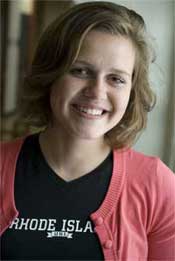For example, this year three URI honors students won Barry M. Goldwater Scholarships, one honors student won a Morris K. Udall Scholarship, and one graduate student was awarded a Fulbright scholarship. Since 2001, that brings the total of Goldwaters to nine, the number of Udalls to six, and the number of Fulbrights won by faculty and students to at least 15.
“In the past 15 years, URI students have been successful in winning highly competitive and prestigious national scholarships, and this year’s scholarship winners continue that tradition,” says Walter von Reinhard, associate director for national scholarships. “URI remains a leader among public universities in this area, and the sustained success of URI students is evidence that the opportunities the University offers to its top students are comparable to those found at the most elite private institutions. The Honors Program, home of the Office of National Scholarships, is proud to encourage and support URI’s top students in their pursuit of excellence—and to help them win the recognition they deserve.”
Here are the details about this year’s winners:
Goldwater Scholarships
Three URI students (out of 278 nationally) won Barry M. Goldwater Scholarships, which were established by Congress and named after the Arizona senator. Goldwater Scholars are nominated by faculty of colleges and universities nationwide and are selected on the basis of academic merit. The one and two year scholarships provide up to $7,500 per year for students studying mathematics, science, and engineering.
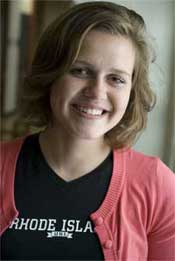 • Megan Anne O’Brien won two prestigious scholarships this spring –the Goldwater and the Ernest F. Hollings Scholarship from the National Oceanic and Atmospheric Administration. The marine biology major from Whitefish Bay, Wisconsin became interested in the environment living on the edge of Lake Michigan. The name of her hometown –whitefish—denotes a once succulent fish whose population and physical size shrank when the invasive quagga mussel entered the lake and began clogging intake pipes, clinging to boats, and creating vast ecological repercussions. O’Brien studied the mussel’s impact at the Great Lake Water Institute while she was still in high school.
• Megan Anne O’Brien won two prestigious scholarships this spring –the Goldwater and the Ernest F. Hollings Scholarship from the National Oceanic and Atmospheric Administration. The marine biology major from Whitefish Bay, Wisconsin became interested in the environment living on the edge of Lake Michigan. The name of her hometown –whitefish—denotes a once succulent fish whose population and physical size shrank when the invasive quagga mussel entered the lake and began clogging intake pipes, clinging to boats, and creating vast ecological repercussions. O’Brien studied the mussel’s impact at the Great Lake Water Institute while she was still in high school.
She has continued studying marine organisms at URI—the evolution of the red alga parasite, the genome sequencing of the common Polysiphonia and its related parasite Chorecolax. She has also researched the acorn barnacles while interning at Brown University, in collaboration with URI’s Experimental Program to Stimulate Competitive Research program. Last winter, she spent 30 days at sea as a lab assistant for URI oceanographer Karen Wishner. O’Brien doesn’t venture far from water during her down time. She competes on URI’s swim and rowing teams. She does touch ground as a member of URI’s Outing Club — backpacking, tenting, and rock climbing and she even finds time to perform with the Irish Step Dance Club. She was selected to be a Coastal Fellow this summer and can’t wait to get back to the lab and the water.
 • Elana Viola of Cranston has the distinction of being awarded two Goldwater Scholarships, one in 2005 and one in 2009. The electrical engineering, chemistry, and math major hopes to employ her unique combination of studies to secure the safety of this country. She focuses on small things that are making a big difference in a variety of areas. It’s called nanotechnology—the study of matter and systems on the atomic or molecular level. How small is that? We’re talking tiny –one nanometer equals one-billionth of a meter. To put that in perspective, the diameter of a piece of human hair is about 100 nanometers. Currently, the devices used to detect chemical, biological, and nuclear materials entering the country are large, stationary, expensive, and notoriously unreliable. The advantages of nanoscale devices are many: they are cheaper to make, use less power, and while they are lighter in weight, they are powerful. Even more importantly, they are portable. “Nanotechnological developments will be critical to our nation’s success,” says the URI student who sees herself well positioned for the challenge. “History has shown that groundbreaking developments happen at the interfaces among the various scientific fields.” But that’s in the future. Viola will graduate in 2011. This summer she will intern at the Naval Undersea Warfare Center in Newport on a remotely operated vehicle (ROV) project. She comes with some ROV experience. She was a member of an all-female high school team that built an ROV that was invited to a competition in Florida hosted by MATE (Marine Advanced Technology Education Center.) Even though the vehicle was damaged in shipping, the team won the award for best design.
• Elana Viola of Cranston has the distinction of being awarded two Goldwater Scholarships, one in 2005 and one in 2009. The electrical engineering, chemistry, and math major hopes to employ her unique combination of studies to secure the safety of this country. She focuses on small things that are making a big difference in a variety of areas. It’s called nanotechnology—the study of matter and systems on the atomic or molecular level. How small is that? We’re talking tiny –one nanometer equals one-billionth of a meter. To put that in perspective, the diameter of a piece of human hair is about 100 nanometers. Currently, the devices used to detect chemical, biological, and nuclear materials entering the country are large, stationary, expensive, and notoriously unreliable. The advantages of nanoscale devices are many: they are cheaper to make, use less power, and while they are lighter in weight, they are powerful. Even more importantly, they are portable. “Nanotechnological developments will be critical to our nation’s success,” says the URI student who sees herself well positioned for the challenge. “History has shown that groundbreaking developments happen at the interfaces among the various scientific fields.” But that’s in the future. Viola will graduate in 2011. This summer she will intern at the Naval Undersea Warfare Center in Newport on a remotely operated vehicle (ROV) project. She comes with some ROV experience. She was a member of an all-female high school team that built an ROV that was invited to a competition in Florida hosted by MATE (Marine Advanced Technology Education Center.) Even though the vehicle was damaged in shipping, the team won the award for best design.
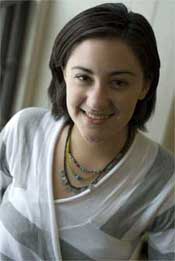 • Sarah Decato saw first-hand how a brain injury can severely impact a life when her older brother, Travis, slipped into a coma following a car accident. Doctors said he may never walk or talk again, but Travis, then 17, is now 32 and working as a car mechanic. “If he can learn to walk and talk again, I can definitely study for an exam,” said Decato, a junior chemistry major from Gardner, Mass. “If we knew more about the brain, we could do a lot of treatment with mental injury, injured soldiers coming back, anyone with a handicap or any type of brain scar.” Decato researches the synthesis of target-specific, functional near-infrared fluorescent probes. Similar in nature to MRI scans, these probes can target specific brain tissues responsible for neurological disorders such as depression, Alzheimer’s disease and Parkinson’s. Decato wants to research the advancement of gadolinium-based probes with cocaine linkers designed to target dopamine transporter (DAT) in the brain. DAT is the body’s reward system, causing the high felt when an individual takes cocaine. Abnormal amounts of DAT can make someone more susceptible to addiction, depression or other neurological disorders. “If we can link something to that receptor, we can find out how much DAT you have in your brain. We can learn about diagnosing post-traumatic stress, depression and more,” she said. Decato – who also has done research in environmental chemistry on water quality – has worked closely with URI Chemistry Professors William Euler and Brenton DeBoef.
• Sarah Decato saw first-hand how a brain injury can severely impact a life when her older brother, Travis, slipped into a coma following a car accident. Doctors said he may never walk or talk again, but Travis, then 17, is now 32 and working as a car mechanic. “If he can learn to walk and talk again, I can definitely study for an exam,” said Decato, a junior chemistry major from Gardner, Mass. “If we knew more about the brain, we could do a lot of treatment with mental injury, injured soldiers coming back, anyone with a handicap or any type of brain scar.” Decato researches the synthesis of target-specific, functional near-infrared fluorescent probes. Similar in nature to MRI scans, these probes can target specific brain tissues responsible for neurological disorders such as depression, Alzheimer’s disease and Parkinson’s. Decato wants to research the advancement of gadolinium-based probes with cocaine linkers designed to target dopamine transporter (DAT) in the brain. DAT is the body’s reward system, causing the high felt when an individual takes cocaine. Abnormal amounts of DAT can make someone more susceptible to addiction, depression or other neurological disorders. “If we can link something to that receptor, we can find out how much DAT you have in your brain. We can learn about diagnosing post-traumatic stress, depression and more,” she said. Decato – who also has done research in environmental chemistry on water quality – has worked closely with URI Chemistry Professors William Euler and Brenton DeBoef.
• Udall Scholarship
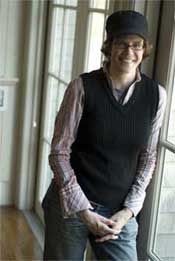 • Joanna Panosky valued her right arm, so she listened to her professor. Doing so helped her earn the prestigious Udall Scholarship from the Morris K. Udall Foundation. A year ago, Panosky – a geosciences major heading into her senior year – was in Arizona with URI Professor and paleontologist David Fastovsky and several classmates when former Udall winner Terri Smith mentioned the award. Fastovsky turned to Panosky and encouraged her to apply, jokingly suggesting that if she didn’t, he’d rip her arm off. Panosky worked with Walter von Reinhart on the application, and was one of only 80 students nationally to win the scholarship. A resident of Peace Dale, Panosky has worked closely with Fastovsky to research new methods of reconstructing ancient food webs by looking at fossilized amino acids. “We want to take what little has been done, refine it and make it more accurate,” Panosky said. “We want to be able to look at the mammals that took over after dinosaurs went extinct and see how their food chain evolved with them.” She would like to combine her field work with her passion for writing in order to communicate the importance of environmental issues with larger audiences. “There is a lot of information out there for people who want to read about stem cell research, global warming, drilling for oil, but it is not always presented in the most accessible manner,” Panosky said. “It doesn’t always reach people who need to know about it.” As a scholarship winner, Panosky will return to Arizona this summer for a Udall conference, where she will network, discuss environmental issues and meet with policymakers.
• Joanna Panosky valued her right arm, so she listened to her professor. Doing so helped her earn the prestigious Udall Scholarship from the Morris K. Udall Foundation. A year ago, Panosky – a geosciences major heading into her senior year – was in Arizona with URI Professor and paleontologist David Fastovsky and several classmates when former Udall winner Terri Smith mentioned the award. Fastovsky turned to Panosky and encouraged her to apply, jokingly suggesting that if she didn’t, he’d rip her arm off. Panosky worked with Walter von Reinhart on the application, and was one of only 80 students nationally to win the scholarship. A resident of Peace Dale, Panosky has worked closely with Fastovsky to research new methods of reconstructing ancient food webs by looking at fossilized amino acids. “We want to take what little has been done, refine it and make it more accurate,” Panosky said. “We want to be able to look at the mammals that took over after dinosaurs went extinct and see how their food chain evolved with them.” She would like to combine her field work with her passion for writing in order to communicate the importance of environmental issues with larger audiences. “There is a lot of information out there for people who want to read about stem cell research, global warming, drilling for oil, but it is not always presented in the most accessible manner,” Panosky said. “It doesn’t always reach people who need to know about it.” As a scholarship winner, Panosky will return to Arizona this summer for a Udall conference, where she will network, discuss environmental issues and meet with policymakers.
Fulbright Scholarship
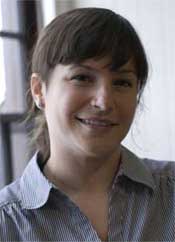 Kristin Almeida of Providence earned a master’s degree in library and information studies. In the fall, she’ll pack her bags and head to Mauritius, an island in the Indian Ocean off Southern Africa where she will spend 10 months, thanks to a 2009-2010 Fulbright grant, which is part of the Fulbright Program, the largest U.S. international exchange program for students, scholars, and professionals designed to increase mutual understanding between Americans and people of other countries. The grant will allow Almeida to combine her two passions—travel that allows immersion into different cultures and librarianship.
Kristin Almeida of Providence earned a master’s degree in library and information studies. In the fall, she’ll pack her bags and head to Mauritius, an island in the Indian Ocean off Southern Africa where she will spend 10 months, thanks to a 2009-2010 Fulbright grant, which is part of the Fulbright Program, the largest U.S. international exchange program for students, scholars, and professionals designed to increase mutual understanding between Americans and people of other countries. The grant will allow Almeida to combine her two passions—travel that allows immersion into different cultures and librarianship.
Almeida, a native Rhode Islander who benefited from studies at all three state higher education institutions, lived three months in Spain and taught English as a second language in Istanbul, Turkey for a year. In fact, an acquaintance she met in Turkey peaked her interest in Mauritius.
With a population of 1.3 million, the island is slightly larger than Rhode Island. Struck by the similarities between the diverse populations of America and Mauritius, she became curious about how Mauritians represented that multiculturalism in the text and images of their children’s books. She noted that American children’s literature is predominantly Eurocentric and other cultures are seldom highlighted.
She discovered that there were only 12 Mauritian children’s book in U.S. libraries and they mostly focus on the dodo, a flightless bird indigenous to Maurtitius that became extinct in the mid-to-late 17th Century.
Almeida thinks we can do better than that. She plans to catalogue and create a bibliography of children books, analyze their content—text and images—and compare their representations of multiculturalism to American children’s books.
“Multiculturalism in children’s literature contributes to a child’s world view by showing the many different ways in which people of different cultural and ethnic groups can coexist peacefully,” the scholar says.
This summer, the Fulbright scholar will teach library research skills and information literacy to the incoming students in URI’s Talent Development Program.

